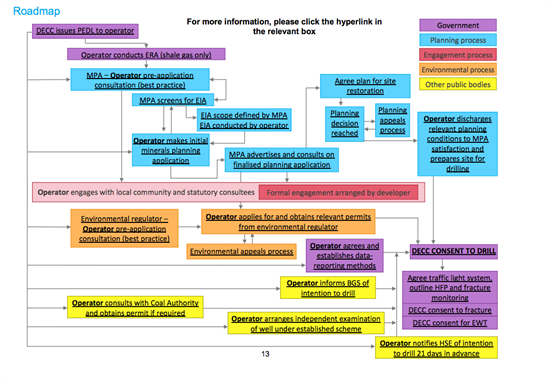Robin Webster
14.01.2014 | 10:00amThe UK government may have successfully killed European Union plans for “muscular” legislation governing shale gas extraction. But with ministers leading the charge against new environmental regulation, can we be sure fracking for shale gas will be safe?
Over the weekend, French oil company Total announced plans to invest £35 million in the UK’s shale gas industry. France has banned oil and gas companies from fracking for shale gas on environmental and safety grounds – but that’s not the case over here. Prime Minister, David Cameron, said yesterday the country is ” going all out for shale”
With fellow shale enthusiast, Poland, the UK has been lobbying against proposed EU rules regulating shale gas extraction. It may have got its way, according to reports – meaning that European countries can develop a new shale gas industry without specific environmental regulation being introduced.
Environment guidance, not environmental laws
Environmentalists are worried fracking for shale gas will have adverse environmental impacts – including water, noise and air pollution, and even minor earthquakes. Studies – by the Royal Society, for example – suggest that the impacts are manageable, but only under a strong regulatory system.
Last year, the European Commission proposed a new “unconventional fuels directive”. The proposed law would oblige European countries to introduce tough legislation on venting and flaring of greenhouse gases, groundwater contamination, and air quality impact, according to online magazine Euractiv.
But UK Prime Minister, David Cameron, wrote to the European Commission’s President, arguing the regulation isn’t needed. UK Environment Minister Owen Paterson hosted a series of dinners to persuade other European countries to come onside, and the prime minister agreed to work with the Polish government in opposing the new regulation.
The UK argues EU-level shale gas regulation will hold up the industry up. It might have a point: A European Commission spokesperson tells Carbon Brief that a new directive could take three years to negotiate between member states, and another year to implement. That would put a pretty hefty barrier in the way of a new shale gas industry.
The UK may have got its way. Reuters reports the commission will instead release ‘ guidance‘ on extracting shale gas – likely to be published next Wednesday as a part of the EU’s wider climate and energy package. The guidance won’t be legally binding, but it can be implemented immediately.
Shale gas regulation in the UK
This doesn’t mean energy companies will be able to frack shale gas where and when they like, however. In addition to existing European law, Cameron boasts this country already has “one of the most stringent” regulatory systems for oil and gas extraction in the world as a result of its history of extracting North Sea oil and gas. The government appears to view developing a shale gas-specific regulatory system as a process of consolidation rather than introducing new laws.
In December, the Department for Energy and Climate Change published a regulatory roadmap summarising the process of applying for permission to explore for shale gas as it stands. Its summary diagram looks like this:
 Source: Onshore oil and gas exploration in the UK: regulation and best practice. Department for Energy and Climate Change, December 2013
Source: Onshore oil and gas exploration in the UK: regulation and best practice. Department for Energy and Climate Change, December 2013
Companies may have to make nine different applications for permits from the Environment Agency, such as for to risks to groundwater, surface water pollution and water abstraction. The agency – which is responsible for putting all the rules together and making sure companies stick to them – is due to consult on further details this year.
And this applies only to the process of exploring for shale gas – rather than extracting it commercially. The Environment Agency hasn’t yet got round to rules for commercial extraction.
Is the UK’s regulation strong enough?
At this stage in the process, it’s difficult to tell how effective the UK’s process for regulating commercial shale gas extraction will be. Many commentators appear to believe that the right rules are already in place – it’s just a matter of pulling them together. Elizabeth Shepherd, of law firm Eversheds, argued to Carbon Brief that the high profile of the issue, and the level of scrutiny applied by environmental groups makes it likely that regulators will be very thorough in the way they apply regulation.
But the government’s keen to develop the industry quickly, and that may create dangers. For example, it wants to speed up the process of applying for environmental permits to explore for shale gas to just two weeks. It gives little indication what this may mean for the need for effective community consultation, however.
And everyone appears to agree that the UK’s regulation is stronger than other countries’. In a recent article, a lawyer acting for energy company GDF Suez – which is also planning to explore for shale gas in the UK – described the UK regulatory and tax regime for shale gas as “less challenging than some others”
Energy minister Michael Fallon tells the Telegraph that other European Union member states should allow the UK to develop its industry quickly:
” We are prepared to take all the risks and all the flack about fracking. The other member states ought to let us do all that and then see what they need to do in terms of legislation. We would be at our own risk.”
The government’s priority is now clearly to press ahead with developing the shale gas industry. If – as ministers hope – the EU backs down next week with plans to regulate it at a European level, the government will undoubtedly have removed a potential barrier to its development. What that means for effective shale gas regulation in this country is a slightly more risky question.

